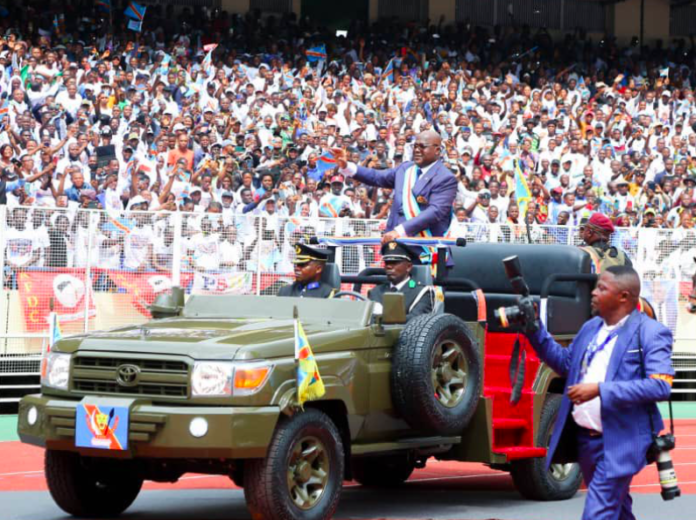The Democratic Republic of Congo (DRC) recently marked a significant moment in its political history with the inauguration of President Félix Tshisekedi for a second term on January 20, 2024. This grand event took place at the Stade des Martyrs in Kinshasa, witnessed by a crowd of approximately 80,000 people, including over two dozen African leaders, signaling a moment of unity and regional interest.
President Tshisekedi’s re-election, confirmed by the DRC’s Constitutional Court, came after securing 73.34% of the votes, as verified by the Independent National Electoral Commission (CENI). His oath of office was a commitment to the Congolese people, emphasizing his dedication to the nation’s unity, interests, and security. The President pledged to uphold the Constitution and other laws, protect the country’s independence and territorial integrity, and prioritize the general welfare while maintaining peace.
The inauguration ceremony was not just a formality but a vibrant display of the DRC’s cultural and military heritage. The event featured military honors, troop inspections by the Chief of Staff of the Armed Forces of the DRC, and the transfer of state symbols by the Constitutional Court. The President’s inaugural address laid out his five-year plan, focusing on job creation through entrepreneurship, inflation control, currency stabilization, national security, economic diversification, access to basic services, and public service efficiency. Highlighting his priorities, Tshisekedi stressed on connecting remote areas, agricultural product transformation, and urban sanitation. He also acknowledged the challenges ahead, including security concerns, regional integration, climate change, and destructive ideologies.
The notable absences of Rwandan President Paul Kagame and Ugandan President Yoweri Museveni, due to regional tensions related to accusations of supporting the M23 rebellion, marked the event. However, the presence of the Burundian President, recognized for military assistance to the DRC against M23 and Rwanda Defense Forces, and the South African President, representing a country contributing troops to the SADC’s peace restoration mission, was warmly received.
In his electoral campaign, President Tshisekedi had taken a firm stance against Rwandan President Paul Kagame, controversially comparing him to Adolf Hitler over alleged expansionist ambitions in the DRC. He vowed a similar downfall for Kagame, especially in light of the ongoing conflicts in regions like Bukavu, troubled by armed groups such as the M23, reportedly backed by Kigali. Tshisekedi’s strong rhetoric against the Congo River Alliance, a politico-military movement led by Corneille Naanga in collaboration with M23, highlighted the security threats in the region.
President Tshisekedi’s resolve to defend the DRC against foreign aggression, particularly the Rwandan aggression “under the guise of M23,” showcases his commitment to safeguarding the nation’s rich resources, especially in the eastern region. His assertive stance signals a readiness to confront challenges, affirming that Rwanda could be impacted without deploying ground troops in case of skirmishes by the Congo River Alliance.





























































